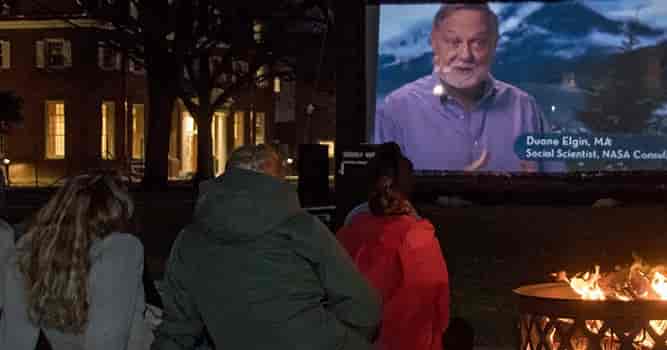 What can we do now?
What can we do now?
That simple but compelling question was at the heart of the sixth annual Bucknell Sustainability Symposium, held March 19–23 on campus.
The interdisciplinary event featured faculty-led discussions, student presentations, snap talks, an outdoor movie and a keynote address, all centered on the call-to-action theme “Climate Changes: All Hands on Deck.”
“We chose this theme because only by working together and combining diverse areas of expertise and perspectives can we fully understand and address the challenges of climate change,” said Jessica Newlin, professor of civil & environmental engineering and interim executive director of the Bucknell Center for Sustainability & the Environment (BCSE), which co-sponsored the symposium. “The BCSE’s main goal was to promote interdisciplinary discussions on the vital challenges that climate change presents to the planet.”
New this year was a session that enabled students interested in careers in sustainability to meet Bucknell alumni working on environmental issues. The alumni panel included Nga Nguyen ’08, a data science consultant with World Bank Group; Rob Nicholas ’94, assistant research professor in atmospheric science at Penn State University; Jess Scott ’08, who produces courses about sustainable development for an online-education branch of the United Nations; Katelyn Tsukada ’12, residential program manager for utility company Con Edison; and Guy Williams ’76, president and CEO of Detroiters Working for Environmental Justice.
Sean Conway ’20, who majors in managing for sustainability, said learning about the panelists’ varied experiences helped him realize that his own career path may not be linear. “It was great to hear from people who graduated from Bucknell and did a variety of things,” he said. “There was no single path to success.”
Event Stresses Interdisciplinary Cooperation
The symposium also included an address by mathematical economist Graciela Chichilnisky, who discussed the need for scholars to work with researchers outside their disciplines when studying issues related to sustainability. In addition, faculty snap talks addressed the scientific and human sides of climate change. Presenters included Professor Mizuki Takahashi, biology, who discussed human population growth and the planet’s carrying capacity; Professor and Associate Dean of Faculty Karen Castle, chemistry, who described her research on greenhouse gas measurement in the upper atmosphere; and Professor Carol Wayne White, religious studies, who told the audience that humans must begin to view themselves as intrinsic to, rather than separate from, the natural world that sustains us.
Students, faculty, staff and community members also gathered for an open-air showing of the documentary Love Thy Nature: A Vital Journey Into the Natural World and a brainstorming session on ways Bucknell could create a more sustainable campus. Suggestions included the addition of vegetable plants to landscaped areas, increased use of reusable or compostable flatware, and the creation of a sustainability minor.
“A lot of students don’t know what sustainability means,” said Kenzie Burns ’20, who majors in environmental engineering. “We should make changes that help sustainable behavior come naturally to us after we graduate.”
Speaking at a snap talk session, White said Bucknell’s interdisciplinary, liberal-arts tradition should equip students to take action to address climate change, regardless of their chosen vocations.
“Bucknell prepares you for the type of critical thinking you can always use, regardless of what you do in the future,” she said. “You can take what the University is offering and apply your own sense of passion and love to whatever path you choose.”
Source: Bucknell University
ALSO READ:
China reaches 2020 carbon emission target three years ahead of schedule
Climate Change Could Force Over 140 Million to Migrate Within Countries by 2050: World Bank
Stakeholders discusses market mechanism under Paris Climate Agreement


